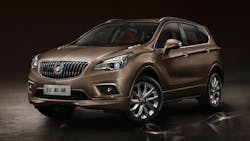US Administration Upholds Tariff on GM's Chinese-Made Buick
The largest U.S. automaker can’t get a pass on tariffs snagging one of its models. The Trump administration refused to grant General Motors Co. an exclusion for its Chinese-built Buick Envision sport utility vehicle, keeping in place a 25% duty on the import.
In a letter dated May 29, the Office of the U.S. Trade Representative denied the requested tariff relief by saying the vehicle was “strategically important or related” to Chinese industrial programs such as "Made in China 2025," which it views as a national security risk. That initiative issued by Chinese Premier Li Keqianq is designed to help the country produce higher-value products.
GM said in its July of 2018 petition that tariff relief was necessary to help the Buick brand compete against “foreign competitors” in the U.S. market, including Honda Motor Co.'s Acura brand, Volkswagen AG‘s Audi and Daimler AG‘s Mercedes-Benz.
Earlier last month, the U.S. Trade Representative denied a similar request from Volvo AB for tariff exclusion on its Chinese-made XC60 mid-sized SUV. The Swedish automaker, which is owned by China’s Zhejiang Geely Holding Group Co., had asked for the exemption last October, saying it would assist in its transition to planned U.S. production of the vehicle.
GM sold just over 30,000 Envision models last year. Despite those relatively low sales volumes, the SUV is key for the Buick lineup as a mid-sized entry that sits in between the compact Encore and three-row Enclave. The vehicle, which has a starting price of $32,000, saw sales fall more than 25% last year. Buick lowered the price by $2,000 just before the tariff was put in place.
GM has not passed on any of the costs of the tariff on the Buick model to consumers, said spokesman Stuart Fowle. He said the SUV’s drop in sales is related more to competition in the market than higher prices.
The USTR also denied several other exclusion requests from GM for parts, including antenna assemblies, on grounds the company failed to show that the duty would cause “severe economic harm.” The company could still get an exclusion if a similar product from another company is granted relief, the trade representative’s office said.
By David Welch and Mark Niquette
About the Author
Bloomberg
Licensed content from Bloomberg, copyright 2016.
